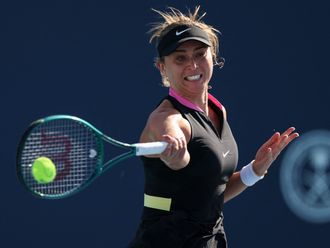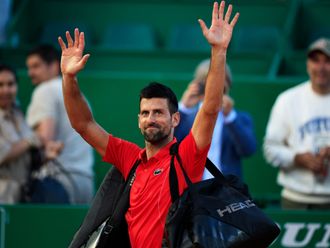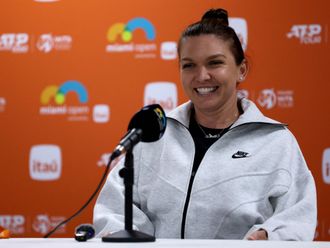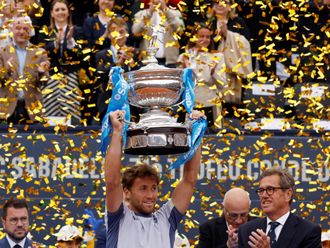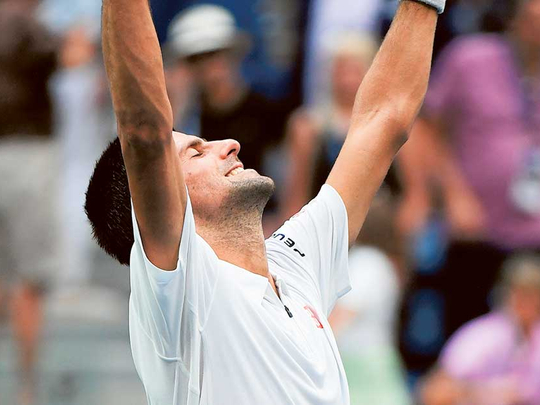
New York: This was a feast for the fickle: If you didn’t like what you were seeing at the US Open in the men’s semi-finals, just wait a few minutes and let nature take its course.
And it did.
Novak Djokovic and Stan Wawrinka navigated through a variety of difficult conditions and equally tricky opponents on Friday. The top-seeded Djokovic prevailed despite suffocating humidity, physical issues and the wildly unpredictable nature and head games of Frenchman Gael Monfils to win, 6-3, 6-2, 3-6, 6-2, in 2 hours 33 minutes.
In Sunday’s final, Djokovic will face No. 3 Wawrinka. Conditions were only slightly better in the Wawrinka-Kei Nishikori semi-final later in the day, still oppressively humid and featuring a rain delay in the third set. Then the roof was closed and Nishikori came out with a bit more punch after the seven-minute break. Wawrinka fought off a break point in the ninth game and then broke Nishikori’s serve to take the third set and won the first 10 points of the fourth on his way to a 4-6, 7-5, 6-4, 6-2 victory in 3 hours 8 minutes.
Djokovic is 19-4 against Wawrinka, and the last time they met in a Grand Slam final was at the 2015 French Open, where Wawrinka won in four sets. Djokovic will be attempting to win his 13th Grand Slam singles title, Wawrinka his third.
Wawrinka, who survived a match point in the third round against Dan Evans, said he noticed that the “conditions were terrible” in the Djokovic-Monfils semi-final, adding in his post-match TV interview that you have to “almost enjoy it because you don’t have a choice.”
The Djokovic-Monfils encounter was notable for its sheer unpredictability.
Namely, Gael being Gael.
Monfils was on the verge of losing the first set in what seemed like a New York minute. He flipped through his options and happened upon a tactical change, one designed to get into the mind of his Serbian opponent. “I know it’s not good, but I made a sign to my coach and say, ‘OK, I’m going to Plan B, actually,’” Monfils said.
Plan B was his version of rope-a-dope. He moved up to return serve and started chipping the ball back, slowing the pace, even serving and volleying on his second serve. His counterintuitive tactics and occasionally casual approach at times drew pointed criticism from ESPN commentator John McEnroe. The crowd booed Monfils, who lost the first two sets and fell behind 2-0 in the third before he found something that worked and won back the love of the crowd.
“When I try a little bit to play ‘original’ tennis is where he kill me,” Monfils said.
Djokovic cheerfully admitted that Monfils got into his head for one or two games.
“I had phases when I was [hacked] off, phases when I was entertained by what he was doing and phases where I was upset with myself for allowing him to do whatever he does to disturb my game and my rhythm,” Djokovic said.
“So it went through it all. It was a great theatre experience today.”
Until Friday, Monfils had had an inspired run, not losing a set at the Open, and had been playing the most complete tennis of his career. On a brutally humid day, he had no answers for the world No. 1 until the third set.
“I’m very sad to learn that such a legend criticise me, because at the end, what I can say to John [McEnroe] is, ‘John, I want to be the best. It’s tough and I try my best,’” Monfils said. “I’m sorry if you think I’m unprofessional.”
Djokovic was asked if he was familiar with boxer Muhammad Ali’s rope-a-dope strategy.
“Boxing and tennis, it’s one-on-one, but I wouldn’t like to be in the ring with Muhammad Ali and going with the punches,” he said. “Today, there was a lot of punches on the tennis ball going back and forth. It was really exhausting ... Physically we were taking each other to the limit.”
Djokovic came to New York with questions about his wrist and was devastated about his first-round loss at the Olympics. He had the misfortune of facing a former Grand Slam champion, Juan Martin del Potro, in the first round in Rio de Janeiro.
It was a deeply unlucky moment to catch so talented a player at such a critical early stage. Djokovic made no secret of the fact that winning a gold medal in the Olympics was a priority on his 2016 tennis calendar. Here, perhaps benefiting from whatever karma the tennis gods may dispense, he’d needed to spend just 6 1/2 hours on the court to get to the semi-finals, with three opponents retiring along the way for various reasons.


